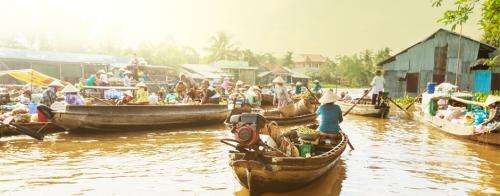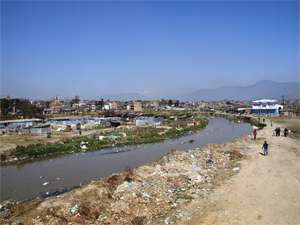Science brings reason to duels over resources

Wars have been foretold in future scenarios where climate change and population pressures over-stress shared river resources. Scientists believe they can rewrite this grim prophecy.
There has been a surprise omission from the equation used to formulate policy responses to some of the world's most pressing water resource and water-sharing challenges.
National economics and politics tend to be the dominant influences on negotiations for sharing diminishing, and often contested, water resources. What has been missing is an equal infusion of science: a potentially costly omission that some are pushing hard to rectify.
Dr Paul McShane, chief research officer with the Monash Sustainability Institute, is leading a multidisciplinary effort to provide governments and their agencies with research-backed data to facilitate more informed policies and agreements.
"Our main objective is to identify courses of action which, while inevitably requiring compromise, can also provide mutual benefit," he says.
At the core of the issue is the increase in demand on rivers that are a finite resource and likely to be further affected by climate change.
This is being tackled in a project, now 18 months in, to develop regional collaboration in river basin management as an overarching response to the expected impacts of climate change.
Most countries in the two main regions covered by the project – south Asia and the Indochina Peninsula – have increasingly divergent priorities for their shared river resources. For some, agricultural development for poverty alleviation and economic advancement remains the priority.
For others the demand is swinging more towards industrial and urban growth and energy generation.
Dr McShane, who has worked extensively in South-East Asia advising governments on sustainable development, says the two main areas of tension are the Mekong, which supplies six countries (Myanmar, China, Laos, Vietnam, Thailand and Cambodia), and south Asia, where Pakistan, India, Bangladesh, China and Myanmar share six key Himalayas-sourced rivers (the Indus, Brahmaputra, Ganges, Irrawaddy, Yangtze and Yellow Rivers).
Putting science into management

Dr McShane's Monash University team is working with several collaborators, in particular the Nepal-based International Centre for Integrated Mountain Development.
"Our task is to explore mutual benefits, because given the asymmetric power of countries such as India and China, there is not a lot of bargaining power for countries such as Bangladesh or Cambodia in asking for equal access to water – for saying 'we would prefer it if you didn't dam rivers flowing into our country'," he says.
"So we have to find a basis for apolitical, whole-of-catchment management, and the science supporting this has to be robust and transparent."
As an example of mutual benefit, he cites China's need for the Mekong as a transport route. "It doesn't want downstream countries over-clearing land and creating erosion that increases sediment loads in the river. So keeping the river navigable becomes leverage for downstream countries against detrimental upstream activities, such as diversions and dams."
Other examples of emerging cooperation in this region are concerns that Chinese dams in the Mekong's upper reaches might disrupt the breeding patterns of fish, which provide 70 per cent of the region's dietary protein. China was able to show that its dams were too far upstream to have an effect, but the same concerns have led Laos to hold off on some of its planned dams for hydro-electricity.
Dr McShane says the opportunity for a collaborative discourse exists for the Mekong-sharing countries through the Mekong River Commission, and while China is not a member it has shown that it is listening to the concerns of other riparian states.
South Asia does not have this structure and, Dr McShane notes, "the stakes there are high".
Collectively the rivers here support nearly three billion people and the complexity of the situation is why the current research project has to be multidisciplinary. "It's one thing for us to consider the biophysical aspects – the hydrology, sedimentation, land use et cetera – but the real work is in the socioeconomic and political issues – how to reconcile the diversity in culture, religion, ethnicity and poverty that influences the behaviour of people and their governments."
Dr McShane says there is considerable frustration already with perceived imbalances in water-sharing arrangements.
"You have India wanting to build a dam on the Indus River, which flows into Pakistan, which relies on it for its economic mainstay – agriculture. The whole of Pakistan is, in effect, the Indus Valley.
"Added to this potential conflict, the Indus River sources much of its water from glacier and snow melts in the Himalayas and this is almost certainly going to be affected by climate change. An increased melt may mean more water in the short term, but significantly reduced flows in the longer term. Superimpose over this the cultural, religious and political conflicts between India and Pakistan and you have a scary prospect."
Dr Shresth Tayal, from India's Energy and Resources Institute, says geopolitical constraints have limited river basin management to governments, and restricted any significant knowledge exchange among the stakeholders from riparian countries.
"Now, with increasing water demand due to urbanisation, and impacts of climate change on glacier catchments as well as rainfall patterns, future water security is at stake and likely to affect the geopolitical stability of the region," he says.
"This is why this multidisciplinary research collaboration is such a significant platform for researchers from riparian countries. We can exchange views, research and understanding about river basin management, and develop a shared understanding and mutual trust about water issues to help develop a regional perspective."
Dr McShane says researchers have to function as knowledge brokers: to make sure there is a link between policy and research, not just policy and nationalism.
"We have to bring together the economists, geographers, geologists, anthropologists and engineers and examine the mutual benefits and the trade-offs to come to decisions that balance the needs of people and each country's sustainable economic growth."
Part of the project is also exploring new water-saving technologies, particularly in large and increasingly thirsty cities such as India's Mumbai with its 20 million people. "A few extended dry seasons, and that city could run out of water," Dr McShane says. "So are there innovative ways to collect and store water that is otherwise being lost as storm water? Is there technology we can employ in Mumbai now to avert a water crisis?"
These are questions that researchers know cannot go unanswered. There is no life without water, and that makes water-sharing one of humanity's greatest challenges.
Provided by Monash University


















